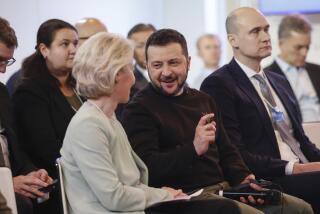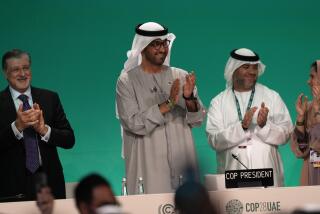In Copenhagen, Obama urges action
Reporting from Copenhagen — President Obama exhorted world leaders at international climate talks to “recognize it is better to act than talk” and seal a framework agreement on controlling greenhouse gases.
In a relatively brief speech to a session of more than 100 heads of state from around the world, Obama sketched the pillars of a possible deal: commitments by industrialized and fast-growing countries to limit emissions, a way of monitoring whether countries keep their emissions commitments and a grand aid package to help poor nations adapt to climate change and transition to low-emission energy.
The president promised that the United States would keep its pledge to reduce emissions -- in the range of 17 percent below 2005 levels by 2020 -- “no matter what happens in Copenhagen.” But he also warned that the world risked, by failing to come to agreement here, prolonging an already protracted debate while the effects of climate change worsen.
“We are ready to get this done today,” Obama said. “But there has to be movement on all sides.”
The biggest movement still must come between the United States and China, who are fencing over the transparency issue, and will continue in one-on-one talks later today.
In a nod to Chinese concerns, Obama said any verification mechanism for emissions pledges “need not be intrusive, or infringe upon sovereignty.” But he also said that any agreement without a transparency provision would be “a hollow victory.”
Shortly before Obama spoke, Chinese Premier Wen Jiabao danced around the transparency question in a short speech to the conference, though he said China “will honor our word with real action. Whatever this conference may produce, we will remain committed to achieving and even exceeding the target” it has set for reducing emissions as a share of its growing economy.
Other heads of state expressed varying levels of hope today that the talks will end in agreement, and some tossed new chips on the table in a bid for progress.
Brazilian President Luiz Lula da Silva said his nation would join industrialized countries in providing climate-related financial assistance to the world’s poorest and must climate-vulnerable countries. He said he was frustrated by the pace of the talks -- citing a meeting he and other leaders slogged through until 2 a.m. today -- but was still hoping for a sort of divine intervention to rescue negotiations.
“I don’t know if some angel or some wise men will come down to this (meeting) and put the intelligence into our minds that we’ve lacked until now,” he said. “Since I believe in God, I believe in miracles. And a miracle can happen, and I want to be part of that miracle.”
Many attendees this morning were pinning their salvation hopes on Obama, who arrived on Air Force One and immediately swung into the talks, meeting with leaders from Europe, China and several other wealthy and poor nations.
Underscoring the importance that delegates here have attached to the president’s visit, large-screen televisions in the host Bella Center broadcast live BBC news footage of Obama’s limousine arriving from the Copenhagen airport. Delegates and observers of the talks paused in the hallways to watch.
Obama met with the heads of Britain, Australia, France, Denmark, Norway, Germany, the European Commission, Japan, South Korea, Ethiopia, Bangladesh, Brazil, Russia, India, Mexico, Spain and Columbia, along with a Chinese vice foreign minister, the White House said.
The large-group discussion came as summit organizers were working through a new draft of an agreement, though officials close to the talks cautioned that several key points were still in flux on the scheduled last day of the conference. Colombian President Alvaro Uribe said in a speech this afternoon that the draft included an “auto-verification” form of transparency, a phrase that suggested compromise.
Nations gathered here have long abandoned hopes of hammering out a new global warming treaty to replace the 1997 Kyoto Protocol, which the United States never ratified. Instead, they’re seeking a declaration on warming that would be a framework for a new treaty, with a goal of finalizing that treaty next year.
In his address, Obama warned his fellow leaders that “we are running short on time” for even a framework agreement. Invoking language reminiscent of his major campaign speeches, he told the audience, “We can embrace this accord, take a substantial step forward, and continue to refine it and build upon its foundation. We can do that, and everyone who is in this room will be a part of an historic endeavor -- one that makes life better for our children and grandchildren.
“Or we can choose delay, falling back into the same divisions that have stood in the way of action for years. And we will be back having the same stale arguments month after month, year after year, perhaps decade after decade -- all while the danger of climate change grows until it is irreversible.”
More to Read
Get the L.A. Times Politics newsletter
Deeply reported insights into legislation, politics and policy from Sacramento, Washington and beyond. In your inbox three times per week.
You may occasionally receive promotional content from the Los Angeles Times.









